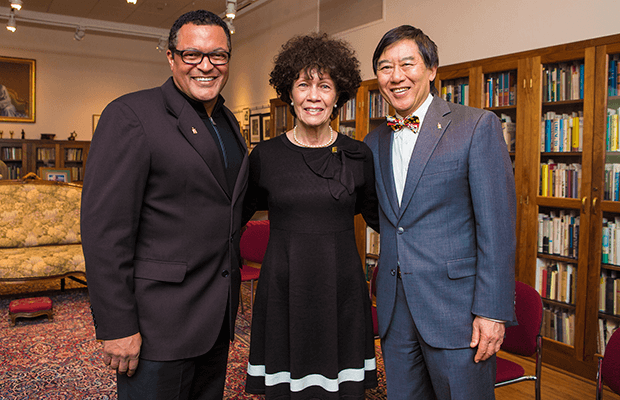- November 20, 2015
- By Lauren Brown
A new memorial on campus dedicated to abolitionist and statesman Frederick Douglass depicts one of the most important figures in state history as he was: a man of words who was bigger than life.
Construction wrapped up this fall on a 4,500-square-foot area on Hornbake Plaza featuring inspiring quotes from Douglass carved into pavers and a new wall, plant beds, lighting and benches. An 8-foot-tall bronze statue (below) was revealed to the university community, state leaders and Douglass’ descendants at a ceremony Nov. 18, with him posed as a young agitator in mid-speech, flinging his hands in the air, his cape and coat flapping behind him.
Distinguished University Professor Ira Berlin, a historian and authority on American slavery, organized the effort among a small group of faculty and administrators to commemorate him on Maryland’s flagship campus.
“Douglass spoke to or embodied all of the things that we believe in: equality, education, self-improvement and women’s rights,” Berlin says.
Douglass was born a slave on an Eastern Shore plantation around 1818, and was sent to serve his owner’s relatives in Baltimore around age 10. He defied rules forbidding slaves from learning to read or write, and began speaking out against slavery as a teen. He later escaped, and settled in Massachusetts.
During the 1840s, when fears ran high that Southerners would capture Douglass and return him to slavery, he fled to Ireland, then Britain. Finding conditions for the Irish poor as wretched as for slaves back home, he began refining his positions on freedom and civil rights—and his oratory.

Vice President for Research Patrick O’Shea, a native of Cork and avid historian, helped dedicate a plaque to Douglass in 2012 at the site of his last speech in that city. There O’Shea heard about a Welsh sculptor’s plans for a new statue, and he helped connect UMD with sculptor Andrew Edwards.
The statue’s construction and delivery were funded in part with money raised by UMD’s group pushing the project, known as the North Stars (named after the guiding direction to freedom and one of Douglass’ newspapers).
Douglass’ importance is already reflected on campus in varied ways: anthropology Professor Mark Leone is researching the Wye Plantation, where Douglass was enslaved; English Professor Robert Levine is editing two of Douglass’ autobiographies and writing a book on him; and doctoral students have a yearlong project with University College Cork on Douglass’ impact.